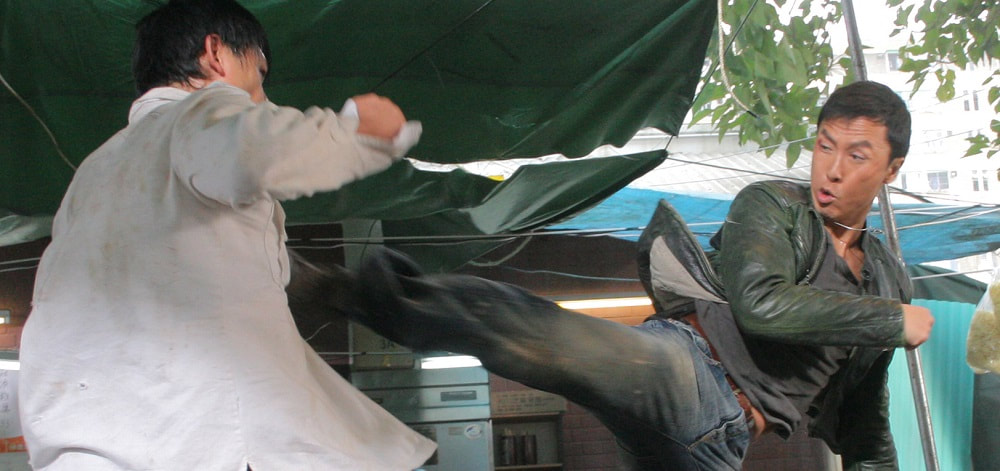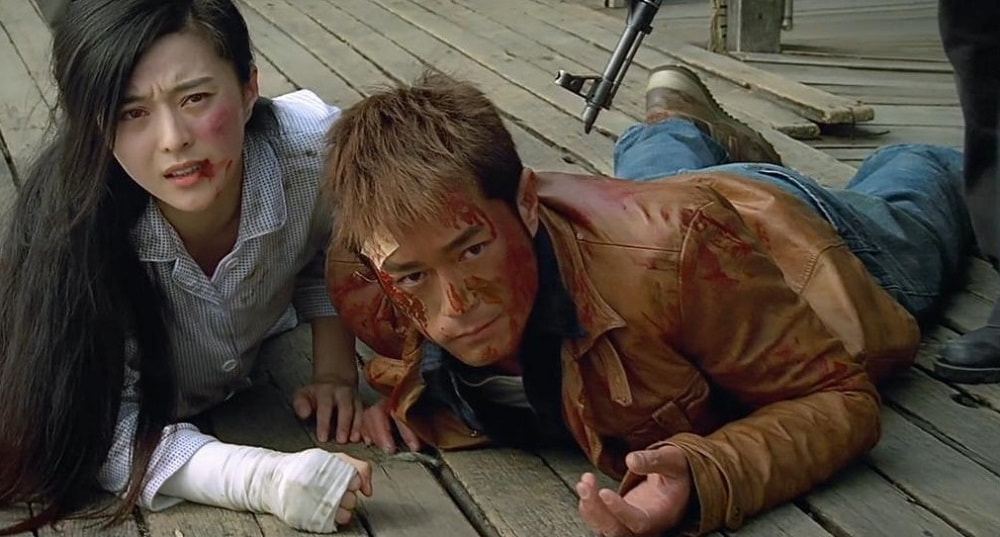|
An Action Canon is a new series focusing on the action movies that, for me, represent the best and most important entries in the genre. Each entry will look at what makes the film special, and how it fits into the overall history of action movies.
Flash Point combines the talents of director Wilson Yip and star Donnie Yen, two of the foremost individuals who kept the fire of Hong Kong action cinema burning in the 2000s. The two had worked together before, and would do so again, but Flash Point is arguably the film on which their abilities really clicked for the first time. On this project, Yip and Yen helped to prove that Hong Kong action movies still had some fight left in them, and set the stage for their later collaborations - notably the Ip Man series.
Flash Point is a modern-day, urban martial arts movie set before the handover of Hong Kong from British to Chinese rule - that is to say, at some point before July 1997. Donnie Yen plays Detective Ma Jun, essentially the archetypal rule-breaking (and bone-breaking) tough-guy cop in the tradition stretching back to Dirty Harry (1971). He is partnered up with Wilson (Louis Koo), a fellow officer working undercover with a trio of gangster brothers who first entered Hong Kong as refugees from Vietnam. The brothers, led by Tony (Collin Chou) are muscling in on the local Triads. The struggle between the cops and the criminals puts police officers, bystanders, and Wilson’s girlfriend Judy (Fan Bingbing) in the firing line. Ultimately, the conflict ends in a showdown up in the New Territories, and a fight for the ages between Donnie Yen and Collin Chou.
At first glance, there is little that is novel about the story for Flash Point. The film takes influences from a host of earlier Hong Kong movies - for example, the undercover angle recalls Infernal Affairs, which had briefly reinvigorated the Hong Kong film industry upon release in 2002. The character of Ma Jun resembles “Tequila” Yuen, the similarly stubborn cop played by Chow Yun-fat in Hard Boiled (1992). The similarity even extends to a flair for music - Yuen played the clarinet in a jazz club, while Ma Jun plays drums in the police department band. In general, the overall cops-and-criminals theme could be taken from any number of films made in Hong Kong over the previous 25 years. With all that being said, there is more going on in Flash Point than initially meets the eye and this added depth helps keep the film fresh. Too often, the scenes of drama or exposition in action movies come off as rote or perfunctory. Here, they work well and genuinely augment the story. Wilson’s pitiful home life reinforces the absolute isolation of undercover work - the arrangement of dozens of empty beer bottles and a single chair on his apartment roof speaks of his many nights spent brooding alone. The Vietnamese brothers genuinely love their elderly mother, who suffers with dementia, and seem quite upset when so few members of their criminal fraternity show up for her 80th birthday party. In the earlier collaboration between Yip and Yen, SPL: Sha Po Lang (2005), the issue of fathers and sons was a major theme. In Flash Point, there is a subtler emphasis placed on mothers. Besides the brothers' relationship with their mother, there is also a scene in which Ma Jun speaks with his own mother who - feeling neglected by him - decides to leave the city. Further, the character of Judy, who becomes Wilson’s girlfriend, announces to him that she is pregnant and is to become a mother. This information, and Wilson’s reaction to it, has serious implications for the mission to smash Tony’s gang. These deeper elements to the story can be attributed to writers Nicholl Tang and Szeto Kam-Yuen, the latter of whom sadly died of lung cancer in 2012 aged just 48.
One well-known element of the Hong Kong film industry is its well-developed star system, which offers casting directors a rich choice of actors who can reliably fill particular types of roles. While this might be called type-casting in the West, for Hong Kong cinema fans it can become an element of comforting predictability, as it is with Flash Point. For example, here Kent Cheng plays the kindly Inspector Wong, a role he could play in his sleep. Xing Yu is known for playing formidable fighters with short fuses and even shorter life expectancies, and does exactly that as Tiger, the most volatile of the three Vietnamese brothers. The role of Judy demands relatively little from Mainland superstar Fan Bingbing, who in 2007 was just accelerating her meteoric rise to fame and had not yet incurred the ire of the Chinese Communist Party.
For years now, Louis Koo has seemed to be virtually omnipresent in Hong Kong movies with several starring roles per year but in 2007 he was a less powerful industry figure. It is interesting to see him in a role which makes him very much secondary to Donnie Yen, who dominates the film in terms of screen time and with his sheer, muscle-rippling physicality - as demonstrated in a sort of gratuitous beachside scene. Even this minor sequence has a special spark to it. A group of elderly swimmers decide to ignore a sign warning about pollution and charge into the water, their leader shouting: “if it is our fate to die, so be it!” Not surprisingly, little real effort is made to evoke a specifically pre-1997 atmosphere in the film’s locations or production design. Flash Point is a fairly good-looking piece of work, however, with a variety of locations ranging from a seedy nightclub and a nearly-deserted upscale restaurant to the rural, leafy Nam Sang Wai area of the New Territories, where the climax takes place.
Any action movie lives or dies by the strength of its action sequences, and so it is with Flash Point. Donnie Yen served as action director on the film and it reflects his increasing interest at the time in integrating mixed martial arts (MMA) techniques within his own formidable background in wushu and taekwondo. Accordingly, Yen handles the overwhelming majority of the fighting in the film, with Louis Koo relegated to merely throwing the occasional punch.
Significantly, the approach emphasises quality of action scenes over sheer quantity. In the first half, fighting is mostly limited to a few brawls and this gives Yip time to develop the characters and plot within the scope of a sub-90 minute movie. In the second half however, Yen’s action direction gradually comes to the fore in some style. The encounter between Ma Jun and Tiger is less a fight than a savage beatdown, as Ma Jun has truly snapped due to the brothers’ sheer ruthlessness and cruelty. At an outdoor restaurant, the cop relentlessly attacks the criminal, with some great shots including a flying kick through a table. With Tiger dealt with, the action later shifts up to the New Territories and the cops’ effort to bring down the remaining brothers, Archer and Tony. This ultimately leads to the outstanding set piece of the film, the climactic showdown between Ma Jun and Tony in and around a small, abandoned house. This is a scene in which everyone involved is truly firing on all cylinders and the spirit of Hong Kong martial arts movies is emphatically alive and kicking. Donnie Yen and Collin Chou prove themselves to be extraordinary fight performers, as they engage with a combination of striking, throws, holds and genuinely jaw-dropping stunts. This final encounter is truly brutal, with numerous hits that visibly connect and a flowing action style that moves the fighters from one location to another - walls, windows, and floors are used to all their bone-crunching potential. The finale to Flash Point is easily one of the best fight scenes made anywhere in the world during the lean years of the 2000s and makes the film essential viewing for action fans. Between 2008 and 2019, Wilson Yip and Donnie Yen collaborated on the four films of the Ip Man series, which deservedly became an international success and elevated Yen into a star known around the world. That success, though, undoubtedly builds on Flash Point. It’s on this film that the pair proved how effectively they could work together. Flash Point has the feel of a movie made by action fans, for action fans and it delivers completely on those terms. Anyone who has watched and enjoyed the Ip Man series would do well to revisit this earlier collaboration, which showed how Yip and Yen could resuscitate the ailing spirit of the golden age of Hong Kong action cinema.
0 Comments
Your comment will be posted after it is approved.
Leave a Reply. |
About
Exploring classic science fiction, with a focus on the 1950s to the 1990s. Also contributing to Entertainium, where I regularly review new games. Categories
All
|


